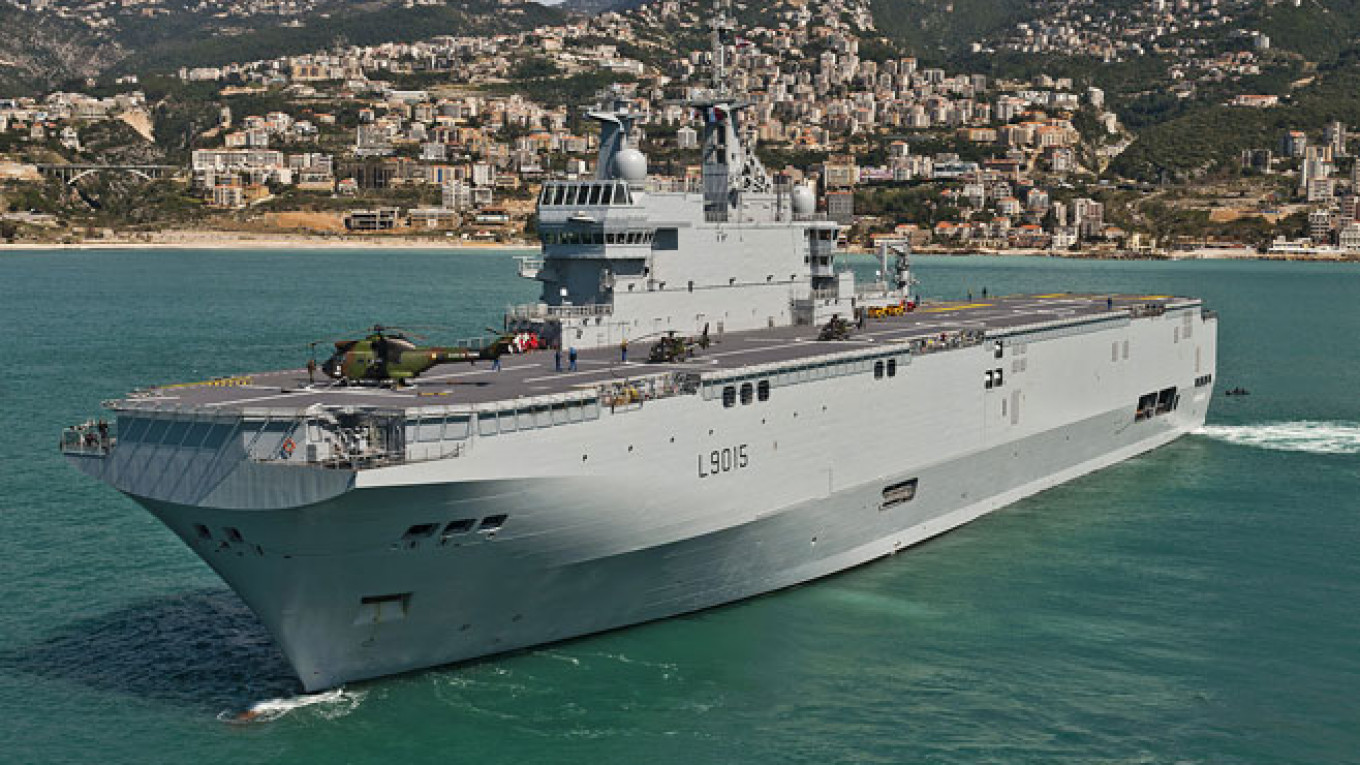German statesman Otto von Bismarck famously observed that Europe represented merely a geographical notion, not a unified political entity. Russia's annexation of Crimea has again validated this acerbic insight. And, amid the absence of any Western or European unity, the sale of the France's highly advanced Mistral-class warships to Russia looms large.
The Mistral is a helicopter carrier near the top of its class of weapons. Its design combines a landing helicopter deck; a floating hospital; an amphibious assault ship that can carry up to 16 heavy helicopters; more than a dozen tanks; one-third of a mechanized regiment; and two hovercraft or four landing craft. It represents a powerful force for amphibious, anti-submarine warfare, and helicopter operations.
Russia has coveted Mistral-class assault ships since 2008. At that time, Admiral Vladimir Vysotsky — then commander in chief of the Russian Navy — said that if Russia had possessed the Mistral, it would have won its war against Georgia in "40 minutes instead of 26 hours."
In 2011, France agreed to produce four such vessels for Moscow at a cost of $1.7 billion. The first two, named the Vladivostok and the Sevastopol, are slated for delivery later in 2014. France is also building the warships' landing craft and on June 22 will begin training 400 Russian seaman on how to operate the Mistral.
Western officials have pressured France not to deliver the ships. But despite protests from the Baltic States, Polish Foreign Minister Radek Sikorski, and U.S. President Barack Obama, France has held firm, claiming that breaking the contract would lead to serious financial losses and endanger jobs at naval construction firm STX at Saint-Nazaire.
The Mistral issue is thus fast becoming a prime exhibit of the disarray and lack of cohesion that now characterizes NATO and of the utter absence of any European unity on defense issues.
The unwillingness of any Western government to date to offer France an alternative market for these ships suggests that they, like France, do not actually take seriously the potential Russian military threats to Europe from the Baltic to the Black Sea, despite Russia's actions in Ukraine.
This lack of a serious perception of a threat exists even though Moscow has broken all its treaties with Ukraine, many of the agreements it signed with the West, and is intensifying its overall military buildup when Western defense spending is either falling or essentially stagnant.
Beyond the failure to grasp Russia's threat, this issue also reveals the absence of any unified European or Western threat assessment concerning Russia. European governments are generally unwilling to reverse past defense policies and begin a meaningful upgrading of defense capabilities or spending.
The Mistral controversy also shows that, even though Moscow continues to do little to support Ukrainian sovereignty, including failing to stop Russian volunteers from joining pro-Russian separatists in eastern Ukraine, nobody is willing to impose truly serious sanctions.
Clearly there are too many important lobbies preventing stronger sanctions. The French defense industry, German businessmen involved with Russia, and many others fear loosing investment and trade more than they worry about European security. This fear of antagonizing Russia undermines any hope of resolute action and highlights for the entire world just how impotent, irresolute, and divided the West is.
Meanwhile, current Russian statements indicate that the military apparently has changed its mind about where to deploy its new Mistral-class vessels.
Originally they were to be based at Vladivostok for deployment with Russia's Pacific Fleet. Now, however, the Navy evidently wants to deploy the first two ships in the Black Sea where they could threaten every littoral state in the Balkans, Ukraine, Turkey, and the Caucasus. The potential deployment of the latter two ships in the Baltic Sea has also quite reasonably aroused intense protests from Poland and the Baltic States, all of whom readily remember their many long years spent under Moscow's control.
In this context it becomes clear that from Moscow's standpoint it is winning or at least incurring acceptable costs. Meanwhile the West's behavior merely confirms the official Russian diagnosis that the West is weak, corrupt, divided, and irresolute.
Certainly the inability of European and Western governments to fashion a truly serious and cohesive response to the crisis in Ukraine should remind those who know their history of the sorry spectacle of European disunity before the Nazi and Fascist threats of the 1930s.But at least those governments did not sell weapons to Nazi leader Adolf Hitler.
Under the circumstances is it utterly fatuous to argue, as some have, that "Putin blinked" over the West's sanctions or that Washington has successfully mobilized world opinion to isolate Russia.
Despite its annexation of Crimea and its ongoing hostility towards Ukraine, Russia is far from isolated. And should the French allow the Mistral sale to go through, it will become a fitting symbol of the shipwreck that the drive for a unified Europe has become.
Stephen Blank is a Senior Fellow at the American Foreign Policy Council
A Message from The Moscow Times:
Dear readers,
We are facing unprecedented challenges. Russia's Prosecutor General's Office has designated The Moscow Times as an "undesirable" organization, criminalizing our work and putting our staff at risk of prosecution. This follows our earlier unjust labeling as a "foreign agent."
These actions are direct attempts to silence independent journalism in Russia. The authorities claim our work "discredits the decisions of the Russian leadership." We see things differently: we strive to provide accurate, unbiased reporting on Russia.
We, the journalists of The Moscow Times, refuse to be silenced. But to continue our work, we need your help.
Your support, no matter how small, makes a world of difference. If you can, please support us monthly starting from just $2. It's quick to set up, and every contribution makes a significant impact.
By supporting The Moscow Times, you're defending open, independent journalism in the face of repression. Thank you for standing with us.
Remind me later.






